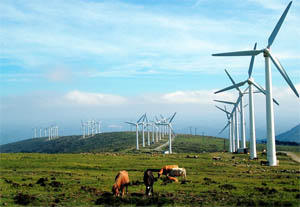Index insurance
 The latter offers complementary solutions to property insurance, particularly in areas where traditional insurance does not provide an adequate response.
The latter offers complementary solutions to property insurance, particularly in areas where traditional insurance does not provide an adequate response.
Index insurance meets the expectations of the client, who benefits not only from protection but also from rapid and transparent compensation.
The scope of application of index insurance
Index insurance (also known as parametric insurance) is strongly linked to weather data. It is estimated that the activities of up to 80% of companies can be affected to one degree or another by this new form of insurance. Moreover, 90% of economic losses due to climate change are not insured, hence its enormous potential.
This form of insurance saw the light of day following the emergence of natural disaster coverage for agricultural risks. It has been developed and adapted to several classes of business, notably the energy sector, travel, sports events, entertainment, construction and transportation.
The risks covered remain largely related to climatic events.
| Scope | Covered risks | Impact |
|---|---|---|
Agriculture | Various climate risks | Lack of return and loss of income |
Renewable energy | Lack of wind/sun | Lack of return |
Travels | Storms and rainfall | Cancellations |
Shows / sporting events | Storms and rainfall | Events cancellation |
Construction | Various climate risks | Missed deadlines |
Transportation | Various climate risks | Missed deadlines, cancellation |
Index insurance is linked to the coverage of risks exposed to climatic hazards and to their impact on human activity. It is most often all about protecting the insured against the cancellation of contracts, a reduction or loss of production capacity or agricultural yields.
Agricultural insurance is the field of choice for parametric solutions used by insurers around the world. Contracts offer guarantees against all types of meteorological events: drought in Africa, frost in northern regions, heavy rain, hail, etc.
Moreover, parametric insurance is perfectly suited to cover renewable energy producers. It is, indeed, easy to measure the lack of wind or sunshine.
In the field of aviation, several insurers such as Koala, Moonshot and Axa cover flight delays. The French insurer had been marketing a product under the name of Fizzy until the end of 2019. The number of hours of delay is the element triggering the guarantee. Consequently, if the insured's flight is delayed for two hours, for example, the coverage is triggered automatically, and compensation is paid without any intervention from the insured.
 Shows, sporting events, outdoor concerts, festivals, amusement parks and racetracks are often dependent on the weather. A stormy season can be particularly detrimental for the organizers of such events.
Shows, sporting events, outdoor concerts, festivals, amusement parks and racetracks are often dependent on the weather. A stormy season can be particularly detrimental for the organizers of such events.
For all these activities, parametric solutions are much better convenient than traditional insurance packages.
This niche is attracting new insurers such as Seyna (1) which compensates motorcyclists in the event of excessive rainfall depriving them of races. Other new entrants are attacking the leisure and vacation insurance market by compensating clients after a significant lack of sunshine.
In construction insurance, capricious weather can cause delays in the progress of major projects. The construction company can then seek coverage against late delivery penalties due to bad weather.
In another example, a shipping company may be forced to keep its ships in port due to a storm. Parametric solutions exist to cover such an event. Wave height can be a trigger for insurance coverage.
(1) An insurance company based in France offering innovative and extensive covers in order to meet the growing needs of consumers
Index insurance: a booming market
For the first time, reinsurers were the first to offer parametric products to the market.
Swiss Re and Munich Re positioned themselves very early on in this segment. The Swiss reinsurer very soon initiated a partnership with the World Bank for the implementation of parametric insurance in several developing regions.
Nowadays, index solutions are no longer marketed solely by reinsurers. Insurers have moved into the market, offering a multitude of products in Africa, South America and Asia.
Even if the market offers solutions in multiple domains, it is still the climatic hazard in agriculture that remains the field of choice for index insurance. With the support of governments and even donors, the development of Big Data and new technologies, parametric insurance remains very promising. Not only does it provide a solution to the ill effects of climatic hazards, but it also offers income security to disadvantaged farmers.
Index insurance: product accessibility
Traditional insurance products are widely available. This insurance is accessible worldwide, making it a convenient and relatively simple solution for consumers. In addition, the compensation mechanisms of traditional insurance solutions are understandable to the majority of potential clients.
In contrast, the technological arsenal surrounding parametric insurance makes it a less accessible product. However, the widespread use of the internet and cell phones for financial purposes is a sign of great hope for the future.
On the positive side, parametric insurance is based more on geographic than individual characteristics, which makes it easier to distribute on cell phones. It does not require much personal information from the insured, who is asked to provide mainly practical information.